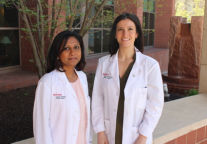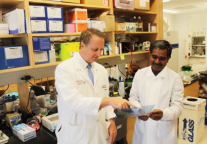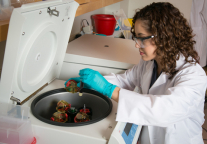From doctor to nurse to social worker and others, our comprehensive team guides both patient and family through their cancer journey. Learn more
Patient Education Library
Patient Support Services
All Rutgers Cancer Institute appointments will take place at the Jack & Sheryl Morris Cancer Center. Please proceed to 15 Division Street New Brunswick, NJ to valet park or 18 Hardenberg Street, New Brunswick, NJ for self-parking in the garage.
Refer to your MyChart portal for appointment details or call 732-235-2465 for assistance.
Please read our guidelines before visiting Rutgers Cancer Institute.
Professor
Department of Pharmacology, Physiology, and Neuroscience
New Jersey Medical School
Rutgers, The State University of New Jersey
The content for the Researcher Directory is maintained by Gina Londino-Greenberg (grl41@cinj.rutgers.edu)
As New Jersey's only National Cancer Institute-designated Comprehensive Care Center, Rutgers Cancer Institute along with its partner RWJ Barnabas Health offer access to cutting-edge clinical trials throughout the state of New Jersey. To obtain more information about available clinical trials, use the search criteria below or call 732-235-7356 for more information.
All Rutgers Cancer Institute appointments will take place at the Jack & Sheryl Morris Cancer Center.
Please proceed to 15 Division Street New Brunswick, NJ to valet park or 18 Hardenberg Street, New Brunswick, NJ for self-parking in the garage. Refer to your MyChart portal for appointment details or call 732-235-2465 for assistance.
Our nationally recognized physicians are specialty trained in medical oncology, radiation oncology or surgical oncology with disease-specific expertise in a particular cancer type(s). Many of our physicians hold leadership positions in national and international organizations sharing their expertise with colleagues around the world and helping to shape the future of cancer treatment.
Our nationally recognized physicians are specialty trained in medical oncology, radiation oncology or surgical oncology with disease-specific expertise in a particular cancer type(s). Many of our physicians hold leadership positions in national and international organizations sharing their expertise with colleagues around the world and helping to shape the future of cancer treatment.
Patient Care

From doctor to nurse to social worker and others, our comprehensive team guides both patient and family through their cancer journey. Learn more
Patient Education Library
Patient Support Services
Clinical Trials
As one of the National Cancer Institute’s designated cancer centers, the Rutgers Cancer Institute of New Jersey provides access to the latest medicines through clinical trials.
Learn more

Research

Cancer research is one of the pillars of the Cancer Institute of New Jersey. Our physician-scientists engage in innovative techniques to unlock the mysteries of cancer, helping to make unique advances in the field.
 Cancer Prevention Experts Provide Top Tips for Reducing Cancer Risk
Cancer Prevention Experts Provide Top Tips for Reducing Cancer Risk
Learn more
 Cancer Survivors May be at Risk for Heart Disease
Cancer Survivors May be at Risk for Heart Disease
Learn more
 Spotlight on Rare Diseases: Gallbladder and Bile Duct Cancers
Spotlight on Rare Diseases: Gallbladder and Bile Duct Cancers
Learn more
 Investigators Explore Impact of Cigarette Smoking and Alcohol Consumption on Black Breast Cancer Survivors
Investigators Explore Impact of Cigarette Smoking and Alcohol Consumption on Black Breast Cancer Survivors
Learn more
 Rutgers Cancer Institute of New Jersey and RWJBarnabas Health to Present Data at the 2023 ASCO Gastrointestinal (GI) Cancers Symposium
Rutgers Cancer Institute of New Jersey and RWJBarnabas Health to Present Data at the 2023 ASCO Gastrointestinal (GI) Cancers Symposium
Learn more
 Study Uncovers Triple Immunotherapy Combination as Potential Treatment for Pancreatic Cancer
Study Uncovers Triple Immunotherapy Combination as Potential Treatment for Pancreatic Cancer
Learn more

